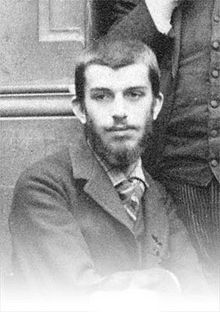Élie Halévy
| Élie Halévy | |
|---|---|

Élie Halévy at age 19.
|
|
| Born |
6 September 1870 Étretat, France |
| Died | 21 August 1937 (aged 66) Sucy-en-Brie, France |
|
Main interests
|
Political philosophy, history |
Élie Halévy (6 September 1870 – 21 August 1937) was a French philosopher and historian who wrote studies of the British utilitarians, the book of essays Era of Tyrannies, and a history of Britain from 1815 to 1914 that influenced British historiography.
Élie Halévy was born in Étretat, Seine-Maritime, where his mother had fled as the German army marched on Paris. His father was the playwright Ludovic Halévy, his brother was the historian Daniel Halévy. His family was of Jewish descent, but his parents were Protestant and he was brought up as a Protestant. Halévy grew up surrounded by musicians, scholars, and politicians. After studying at the École Normale Supérieure, he received his doctorate in philosophy in 1901 with the theses The Platonic Theory of Knowledge and The Origins of Philosophical Radicalism. The latter formed the base of his first major study, The Formation of English Philosophical Radicalism (3 vols., 1901-1904).
In an article of 1893, Halévy suggested that the great moral question of modern thought was how the abstract idea of duty could become a concrete aim of society. This question had first attracted him to the utilitarians, and he found at the core of their answer a fundamental contradiction. Utilitarianism, he said, was based on two principles: first, that the science of the legislator must bring together the naturally divergent interests of individuals in society; and, second, that social order comes about spontaneously through the harmony of individual interests. To Halévy, this exemplified two fundamental human attitudes toward the universe: the contemplation of the astronomer and the intervention of the engineer.
In 1892, Émile Boutmy invited Halévy to lecture on English political ideas at the newly founded School of Political Science. After 1900, he alternated this course with another, on the history of socialism. At the same time he helped found the Revue de métaphysique et de morale, in which he retained an interest until his death.
Halévy's teaching led him to undertake annual trips to England, during which he became the intimate friend of many of the most important scholars and political figures of the age. He thoroughly explored the Jeremy Bentham manuscripts at Cambridge for his work on philosophical radicalism and over the years developed a deep and intensive knowledge of all the sources of 19th-century English history. In 1901 he began to work on the first volume of his masterpiece, the History of the English People in the Nineteenth Century (published from 1913 onwards). In this first volume, he described England in 1815 and sought to explain how England avoided violent social change. "If economic facts explain the course taken by the human race," he wrote, "the England of the nineteenth century was surely, above all other countries, destined to revolution, both politically and religiously." Neither the British constitution nor the Established Church was strong enough to hold the country together. He found the answer in religious nonconformity: "Methodism was the antidote to Jacobinism."
...
Wikipedia
